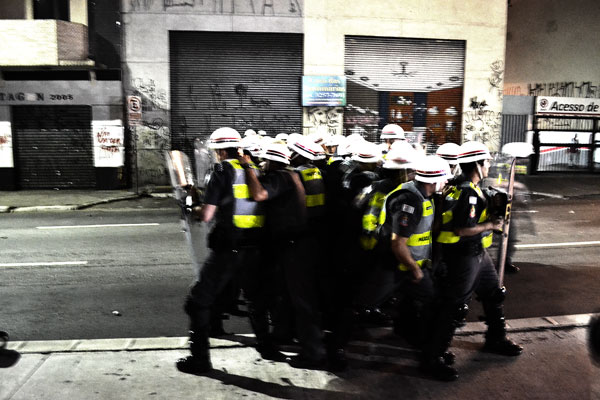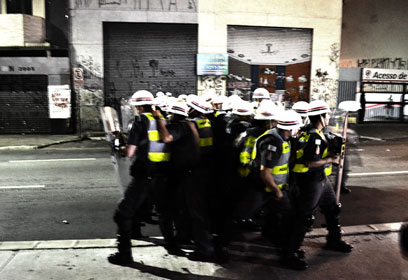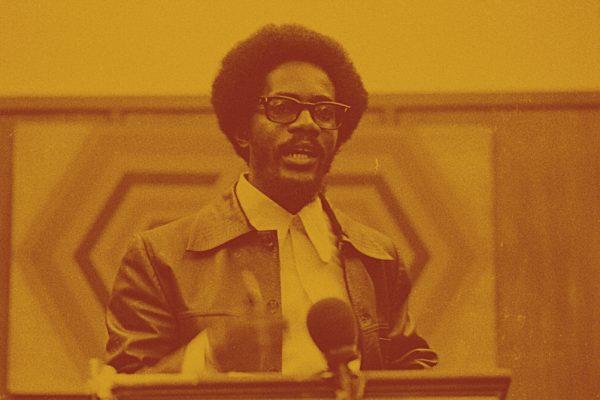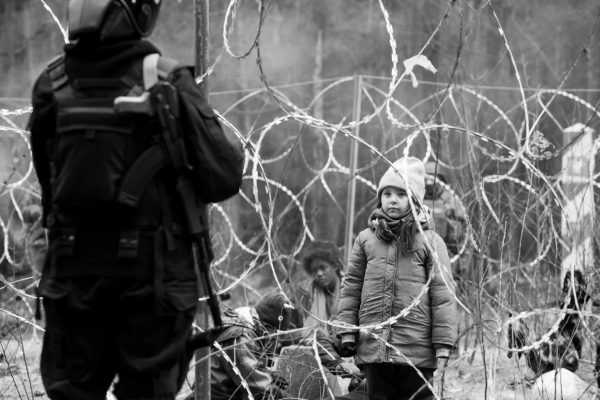
Riot police on the streets of Sao Paolo, May 15, 2014. Photograph: Victor Prat
I was eighteen when the Berlin Wall fell: I belong to the generation that Piketty describes in his preface to Capital in the Twenty-First Century (2014)—those who, as adults, have only known a world without the USSR and whose horizons were marked by failures of state socialism.
I experienced the fall and its aftermath as a student activist in Berkeley, California, far from my native Brazil. While the images from Berlin so clearly portrayed what activists seek—people taking charge of their own circumstances, pushing back against authority, and making history—the Wall’s fall was also disorienting for many. Not only was Communist Eastern Europe coming undone, but unavoidable truths were surfacing, and the idea of an alternative to liberal democracy and free markets seemed to disappear nearly overnight. As terribly flawed as state socialism had been, it had provided a counterpoint to the existing order.
As student activists, we saw this worried our Marxist professors and older activists in ways we didn’t quite understand. We were busy instead inventing our own practice at the time, each of us cobbling together ideas and energy from identity politics, community struggles, anti-imperialism, and other sources. For us, the failure of the GDR only seemed to confirm the suspicion we had been cultivating toward the canon and all-encompassing philosophies: at the end of the day, they don’t work.
The college campus was an exciting place in those years. We often said that the 1990s would make the 1960s look like the 1950s. The 1991 Iraq war would galvanize more students and protests, though in retrospect it returned Berkeley to what Berkeley does best—protest war—and thus postponed so many inevitable questions. The election of a Democrat to the White House in 1992 drained urgency from activism, and the rest of the decade saw many real setbacks for activist communities under the Clinton administration, which only led to a new conservatism under Bush.
My return to Brazil in 1993 and my research and work in the southern city of Porto Alegre put me in touch with a different kind of leftist movement, one that had been freed by the fall of the Wall. A generation of activists—many, but not all, students—had been shaped by their experiences in campaigns that helped to foster Brazil’s transition to democracy in the mid-1980s and then drive out a corrupt president from Brasilia in 1991. These activists, who drew inspiration from a heady mix of Liberation Theology, Paulo Freire, and Third World struggles, hardly glanced at Eastern European socialist states, except as negative examples. Unfettered in those years by the ossified imagination of bureaucratic socialism, they reinvented unionism and urban rights movements by insisting on bottom-up democracy, spaces where popular voices are truly respected, and practices anchored in community solidarity.
This generation also invented a new kind of socialist political party. Officially founded in 1980, the Workers’ Party was from its inception one in which “movements could speak.” It was organized around radically democratic principles, including robust internal democracy. The party came into its own in the late 1980s after winning some municipalities and experimenting with a kind of participatory democracy unprecedented in city governance. As the Wall was coming down in Berlin, Workers’ Party administrators in Porto Alegre were holding the first meetings of a new form of popular rule: participatory budgeting, whereby residents directly controlled municipal investments and, by extension, wielded power over some of the most important decisions of city government. Over the first few years, thousands participated in a system that was organized around social justice, transparent democracy, popular sovereignty, and the collective voice of the poor. Throughout the 1990s, the party evolved, winning elections and gathering voters throughout the country, its practices of local democracy transforming and multiplying, eventually encompassing policy beyond service provision—from AIDS to human rights, racial discrimination, and more. Many new activists rose through the ranks to become party leaders during those years.
In 2001 the World Social Forum chose to hold its first convention in Porto Alegre because the city’s participatory governance represented an alternative to neoliberalism, harnessing popular creativity while avoiding the pitfalls of older leftist strategies. The Forum, the city of Porto Alegre, and Workers’ Party activists in the early 2000s confidently responded to those, in Berkeley and elsewhere, in want of alternatives: real bottom-up democracy was possible and transformative.
Those answers seem less sure today. As I write, national elections in Brazil are unfolding. The Workers’ Party has a reasonable chance of winning its fourth consecutive term in a run-off election. This time, though, its appeal to activists is based solely on its opposition to the economic conservatism the other candidates represents. While the party has achieved significant social gains—such as poverty reduction and greater access to higher education—they were won at the expense of radical democratic principles: the national government has summoned millions of Brazilians in myriad forms of consultation and participation, but they lack real power in decision-making. Not unrelatedly, the party has also shown signs of bureaucratization, hierarchy, and inflexibility. Last June, when millions more Brazilians took to the streets to protest the failings of the political system while it lavished funds on the World Cup, the Workers’ Party was caught by surprise and failed to give a substantive response. Some older activists, now entrenched party functionaries, disappointed their younger counterparts by defending the party and failing to connect with the energy in the streets. More than one analyst has called for a fundamental rethinking of the party.
Perhaps the lesson of Berlin and Porto Alegre over the last twenty-five years lies, then, not in the specific alternatives they offered, but in their testament to activism’s capacity for reinvention.








